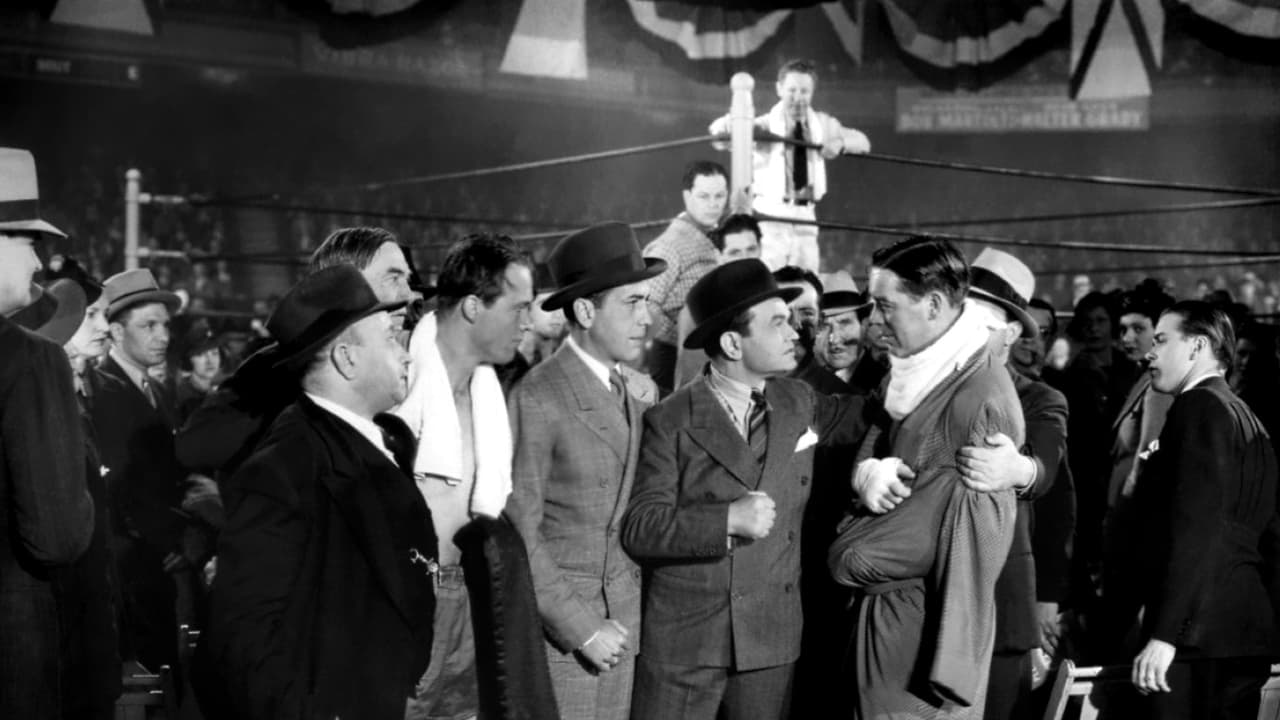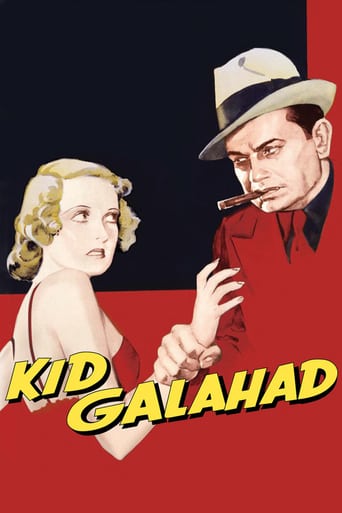

One of the best movies of the year! Incredible from the beginning to the end.
... View MoreThe tone of this movie is interesting -- the stakes are both dramatic and high, but it's balanced with a lot of fun, tongue and cheek dialogue.
... View MoreLet me be very fair here, this is not the best movie in my opinion. But, this movie is fun, it has purpose and is very enjoyable to watch.
... View MoreIt's simply great fun, a winsome film and an occasionally over-the-top luxury fantasy that never flags.
... View MoreYou really cannot go wrong in watching a sport/crime genre film in which you have not one, but two boxing promoters who are both a bit slimy towards their boxing club pugilists, especially when these two promoters are the great actors Humphrey Bogart and Edward G. Robinson. They have a genuine hate on for each other in and out of the ring. Where the stakes are high by fixing fights so that their significant bets come through with their boxers win or loss.Nick Donati (Edward G. Robinson) has just discovered a young and strong hotel bell hop named Ward Guisenberry / Kid Galahad (Wayne Morris) who he manages to a heavyweight championship title fight that Nick actually has mixed feelings about winning and losing since his novice boxer Kid Galahad has fallen in love with Nick's virgin sister Marie (Jane Bryan). The farm boy turned fighter Ward Guisenberry / Kid Galahad has two women that have fallen in love with his boyish charms and ring innocence. Both Nick's little sister Marie and Nick's arm candy night club singer Louise 'Fluff' Phillips (Bette Davis) both have deep feelings for Kid Galahad. Footnote: I for one just was never able to picture actress Bette Davis as "eye candy" with her strange facial appearance that appeared to have been placed in a vise grip and with her rather thin and balding hair?So the two boxing promoters go after the big purse but which promoter is betting on which fighter to win or lose? The film has some aggressive ring fight scenes, a visible hate-on by the two promoters played by Bogart and Robinson, love lost and gained, and crimes that must not go unpunished. What's not to like?I give the film a decent 6 out of 10 rating.Footnote: the 1941 film remake was titled "The Wagons Roll at Night" starring Humphrey Bogart and Eddie Albert. Instead of the naive young man being a boxer as in this film, Eddie Albert joins Humphrey Bogart's circus as their lion tamer when Eddie falls head over heels for Humphrey's little sister played by then 16 year old Joan Leslie. I believe the remake was slightly better than the original Kid Galahad.
... View MoreBoxing promoter Nick Donati (Edward G. Robinson) dumps his fighter who loses in a fight rigged by gangster Turkey Morgan (Humphrey Bogart). Nick and girlfriend Louise 'Fluff' Phillips (Bette Davis) decide to throw a big party with what's left of their money. Turkey crashes the party with his gang. A jealous Turkey starts picking on naive hotel bellhop Ward Guisenberry (Wayne Morris). Turkey's boxer McGraw manhandles Fluff and Ward puts him down with one punch. Nick sets up a match between Ward and McGraw's brother. The inexperienced Ward is losing until he wins with one big punch. While training at the Donati farm, Nick's sister Marie and Ward secretly falls for each other despite Nick's disapproval. He starts fighting for Nick as Kid Galahad.This is a solid boxing movie with all the corruption and the media. Robinson and Bogart are big personalities worthy of being fight promoters. Wayne Morris is a bit of white toast although it fits his character. Everything is great except for the boxing. The boxing is very much of its times and lacks the kinetic energy of a modern movie. It's still fun to see guys wack each other over the head.
... View MoreWhen bellhop Wayne Morris knocks out a heavyweight contender, boxing promoter Edward G. Robinson dubs him Kid Galahad and decides to make a champion out of him. But when Robinson's girlfriend Bette Davis falls for Morris and Morris falls for Robinson's kid sister Jane Bryan, it causes the promoter to turn against his protégé.Good sports drama from Warner Bros. with three big name stars, two of which were still on their way up. Edward G. Robinson's terrific in a role he plays with ease. Bette Davis is likable and sexy in the kind of role she hated playing. Humphrey Bogart plays one of his patented gangster characters. He's always fun. Harry Carey, Sr. is wonderful in a supporting role. First big role for Wayne Morris, who never reached the heights WB groomed him for. He's very likable in an "aww shucks" way. Remade in 1941 as a circus movie, The Wagons Roll At Night, with Bogart tackling the Robinson role. Remade again as an Elvis musical in 1962, probably the most famous of the three. This one's my favorite, though, with all the wonderful flavor WB urban dramas had in the 1930s. Nice boxing scenes and enjoyable characters make it a good one.
... View MoreDirector Michael Curtiz was known for manly films like The Adventures Of Robin Hood, Captain Blood, Angles With Dirty Faces but he also directed women's pictures like Mildred Pierce and the musical Yankee Doodle Dandy. This is the first of six films where Curtiz worked with Humphrey Bogart, his most famous is Casablanca. The powerhouse triumvirate of talent almost overpowers the story. Kid Galahad stars Edward G. Robinson who is wonderful as the headstrong fight promoter, Bette Davis provides romantic chemistry as his compassionate girlfriend and Humphrey Bogart (still early in his career) plays a rival boxing manager that uses gangster tactics to get his own way.Bette Davis had just returned to Warner Bros. after attempting to walk out on her contract in 1935 when she made Kid Galahad, a hybrid gangster-boxing film in 1937. Although far from the types of vehicles that would make her the studio's top box office star in a few years, it served both her and the studio well. Warner's got her name on the marquee to draw her growing legions of female fans to an otherwise male- oriented film, while she got the chance to appeal to a more masculine audience than usual. The result was a hit for her that would remain a classic boxing flick for decades.Francis Wallace's novel, which had been serialized in The Saturday Evening Post, was a natural for Warner Bros. with its mix of boxing action and gangland corruption. The studio had the perfect actor for the role of tough fight manager Nick Donati in Edward G. Robinson, who had been a star there since his triumph in Little Caesar (1931). His gangland rival was a good role for supporting gangster star Humphrey Bogart. And the part of the young bellhop who belts his way to victory when the reigning champ puts the moves on Robinson's girlfriend (Davis), would be ideal for showcasing screen newcomer Wayne Morris. Davis was happy to accept the secondhand role, particularly as she was still waiting for the studio to develop a script for her next big vehicle, Jezebel (1938). She was also eager to work with Robinson, but after one day of shooting, he went to production chief Hal Wallis to demand she be replaced. In his opinion, she was little more than an uncontrolled, although gifted amateur. He would repeat that assessment in his memoirs, arguing that she had left the stage for Hollywood before developing control of her craft. Davis never spoke ill of Robinson, though she observed wryly in later years that he had stopped shooting during a death scene to complain to director Michael Curtiz that she and co-star Jane Bryan were drowning out his final speeches with their sobbing. The stars would never work together again.One lasting relationship that came out of the film was between Davis and Irving Rapper, who would direct her biggest hit, Now, Voyager (1942). Rapper had just been hired as the film's dialogue director when, on his first day, he watched Curtiz staging a fight scene between Davis and Robinson. When Davis failed to respond properly to a shove from Robinson, Curtiz yelled, "That's not the way to fight, you damn bum!" Davis asked him to show her what he wanted, so Curtiz took her place in the scene. Robinson didn't want to throw the director around, afraid the larger man would hurt him, but he got into things when Curtiz started playing the scene as a Davis imitation. When Robinson pushed the director, he banged into a table and bounced back, almost knocking over his leading man. Davis got the point and stepped into the scene. But Robinson forgot to adjust the shove for his much lighter leading lady, and she went flying across the stage, landing in Rapper's lap. "My God, who are you?" she asked. When Rapper introduced himself as the film's new dialogue director, she quipped, "Thank God you caught the ball!" The boxing scenes were as real and brutal as any filmed previously. After the scene in which Morris knocks out a boxer in the ring, Curtiz screamed that it looked fake and demanded a re-take. But they had to wait for the actor to regain consciousness; he really was down for the count. When Kid Galahad came out, the author Wallace was so impressed he sent Morris a telegram, "Thank you for bringing our boy over the border of fiction into reality." Kid Galahad was a hit with critics and audiences alike, with many of them praising Robinson and Davis for their professionalism and singling out Morris as a bright new talent. Ultimately, the studio would fail to come up with suitable follow-ups for the young actor, who would fade into supporting roles his best being in Stanley Kubrick's Paths Of Glory. Many critics also hailed the film as the best boxing picture to date. Please notice the fine character work of actors: Harry Carey as the trainer, Jane Bryan as Robinson's sister, William Haade as the Champ and Joe Cunningham as the reporter.Finally when The Mirisch Bros. bought the story as a vehicle for Elvis Presley (with Gig Young and Lola Albright in the other leads), Warner's re-titled Kid Galahad for television prints as The Battling Bellhop to avoid confusion with the Elvis re-make which was now a comedy-musical-boxing-drama.
... View More